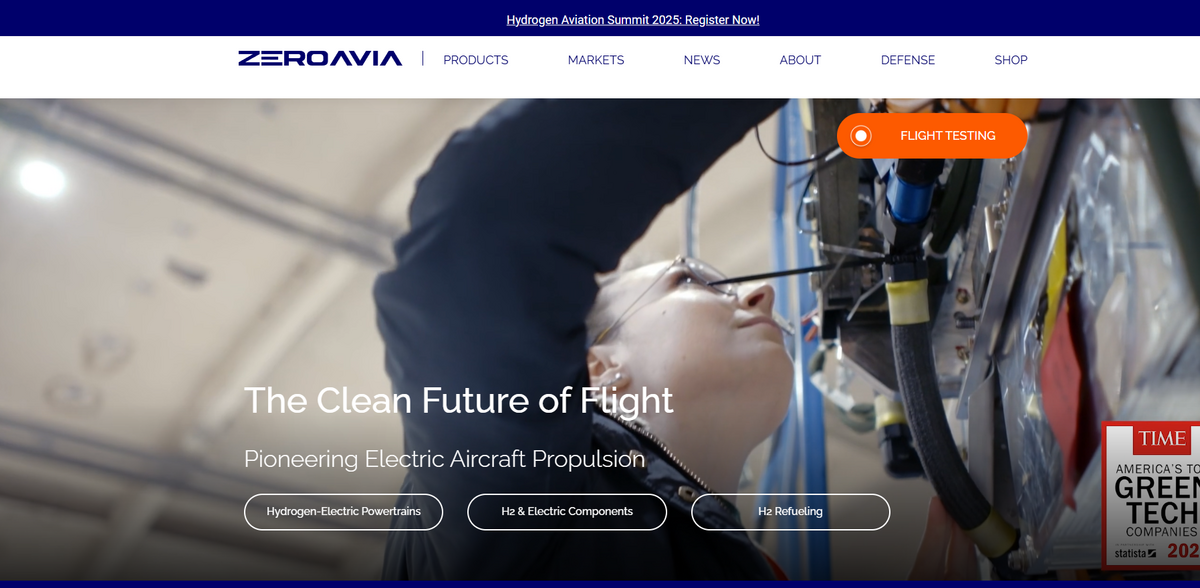What is ZeroAvia’s Project?
ZeroAvia is developing full hydrogen-electric engines for existing commercial aircraft while also supplying hydrogen and electric propulsion component technologies for novel battery, hybrid, and hydrogen-electric air transport applications. The company is building the world’s first practical zero emission aviation powertrain using electric propulsion powered by a hydrogen fuel cell system… This groundbreaking approach started by enabling 500-mile zero emission travel in a 10-20 seat regional aircraft by 2023, with plans to scale the technology to target larger aircraft. The project reflects a dynamic shift in aviation, aiming to transform how aircraft are powered—ushering in an era of greener skies and lower operating costs.
Main Benefits & Key Figures
The main benefits of this venture are seen in its pioneering offerings and the impressive figures behind the technology:
- Hydrogen-Electric Powertrains: ZA600 offers a 600kW system for 10-20 seat regional turboprops by 2026; ZA2000 provides a 2-5MW modular solution for 40-80 seat regional turboprops by 2028; and ZA2000 RJ delivers a 5MW+ option designed for up to 90-seat regional jets by 2030.
- Electric Aviation Components: A highly efficient, lightweight, and fault-tolerant electric propulsion system paired with a modular hydrogen fuel cell platform capable of handling a range of power requirements.
- Hydrogen Airport Refueling Ecosystem: Featuring modular electrolyzers that produce hydrogen on-site, mobile refueling vehicles that efficiently deliver the fuel, and the world-first hydrogen airside to landside pipeline for seamless hydrogen distribution at airports.
- Lower Direct Operating Costs: The unique approach helps the technology capture a significant share of the $300B aircraft hardware and $200B aviation fuel markets.
Innovative Hydrogen-Electric Powertrains
The hydrogen-electric powertrains developed by ZeroAvia—namely, the ZA600, ZA2000, and ZA2000 RJ—represent a transformative innovation in aviation propulsion. These engines are designed to be retrofitted into existing aircraft and have been carefully engineered to provide scalable power outputs suited to different regional aircraft sizes. During flight testing, a prototype ZA600 engine was integrated to power the left side propeller of a Dornier 228 testbed aircraft, clearly showcasing its potential. With a modular design and an emphasis on reliability and performance, these powertrains have set the stage for a zero emission future in aviation… and it’s exciting to see how these developments will redefine industry standards.
Electric Aviation Components & Testing
In addition to the powertrains, ZeroAvia is focusing on the broader ecosystem required for electric propulsion. The electric propulsion system is not only highly efficient but also lightweight and fault-tolerant, making it ideal for various electric aircraft applications. The hydrogen fuel cell system, which is modular by design, ensures that the power generation can be tailored to support a range of requirements. Successful test flights, including those using a 6-seat test aircraft with an FAA airworthiness certificate, underscore the viability of this approach. These components work harmoniously to provide the backbone for zero emission air travel—a leap forward that promises to change the landscape of regional air transport.
Revolutionizing Airport Refueling
A critical aspect of ZeroAvia’s project is the innovative hydrogen airport refueling ecosystem. This system includes modular electrolyzers that produce hydrogen on-site, ensuring fuel availability exactly when needed. Mobile refueling vehicles are deployed to deliver optimal solutions for airport transportation, and a groundbreaking hydrogen airside to landside pipeline has been implemented for efficient hydrogen distribution across airport facilities. This refueling solution not only streamlines operations but also supports sustainable airport management. The integration of these technologies is designed to ensure that airports are fully equipped to handle the demands of a new green era in aviation… making the refueling process as innovative as the engines themselves.
Cutting-Edge Testing and Market Expansion
The project’s testing phase has already generated significant momentum. ZeroAvia has successfully retrofitted its prototype engine to a Dornier 228 – a milestone that provides promising proof-of-concept validation. This success is complemented by strategic collaborations with aircraft operators, manufacturers, and owners who are eager to explore the potential of zero emission flight. Strategic locations, including a UK base at Hangar C2, Cotswold Airport in Kemble and a US facility in Everett, Washington, position the company well to tap into both European and American markets. With the support of government grants, such as a $3.5M award from the UK government, the company strengthens its research and development efforts to further refine the technology.
Project Impact: Sustainable Development Goals
- SDG 7: Affordable and Clean Energy
- SDG 9: Industry, Innovation, and Infrastructure
- SDG 11: Sustainable Cities and Communities
- SDG 13: Climate Action
Global Market Outlook & Future Plans
ZeroAvia has positioned itself at the forefront of a market primed for disruption. With test flights validating the technology and increasing confidence among regulators and industry stakeholders, the company is setting the stage for broad market adoption. The transition from a 6-seat test aircraft to powering regional turboprops and jets is more than a scaling effort—it’s an indication of a future where the aviation industry is reshaped by sustainable practices and innovative technology. Future plans include further refinement of propulsion systems and expansion of the hydrogen refueling infrastructure, paving the way for zero emission flight to become the standard in commercial aviation. By gradually capturing a significant share of the aircraft hardware and aviation fuel markets, ZeroAvia is not just imagining but actively constructing a greener, more efficient future for air travel… and that outlook is truly inspiring.


















